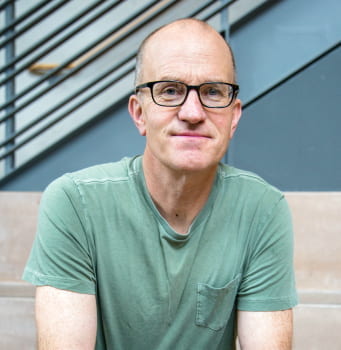Author: Tim Stephens
-

UC Santa Cruz joins the University of California Drug Discovery Consortium
Scott Lokey, professor of chemistry and biochemistry, is the UCSC campus lead for University of California Drug Discovery Consortium and a member of the executive committee. UC Santa Cruz has joined the University of California Drug Discovery Consortium (UC DDC), a cross-campus initiative aimed at building a drug discovery community that actively promotes research translation…
-

Ultrasensitive antigen test detects SARS-CoV-2 and influenza viruses
This illustration shows the setup of the optofluidic chip for rapid detection of single antigens of SARS-CoV-2 and Influenza A. (Image credit: Stambaugh et al., PNAS 2021)
-

$3.7M NIH grant funds development of novel biosensor technology for diagnosing viral infections
Electrical engineer Ali Yanik is leading a team of infectious disease experts developing a low-cost, easy-to-use platform for diagnosing viral infections in point-of-care settings.
-

Bioelectronic device achieves unprecedented control of cell membrane voltage
In an impressive proof-of-concept demonstration, an interdisciplinary team of scientists has developed a bioelectronic system driven by a machine learning algorithm that can shift the membrane voltage in living cells and maintain it at a set point for 10 hours. Every living cell maintains a voltage across the cell membrane that results from differences in…
-

UC Santa Cruz leads research center on botanical dietary supplements
New $5 million NIH grant supports a collaborative research program to understand the cellular mechanisms by which botanical natural products may affect human health
-

New optical technique provides more efficient probe of nanomagnet dynamics
Optical analysis of nanomagnets is achieved by directing a laser pulse at gratings designed to generate surface acoustic waves and focus the vibrational energy of the waves on individual nanomagnets. (Cover image, Applied Physics Letters, May 26, 2020)
-
UCSC researchers are taking on the coronavirus challenge on multiple fronts
UCSC The UC Santa Cruz campus has been eerily quiet since stay-at-home orders went into effect to limit the spread of the coronavirus causing the COVID-19 pandemic. Faculty are adapting to teaching classes online, and research labs have had to shut down much of their work. Nevertheless, many UCSC researchers are finding ways to apply…
-

Molecular switch mechanism explains how mutations shorten biological clocks
UCSC A new study of molecular interactions central to the functioning of biological clocks explains how certain mutations can shorten clock timing, making some people extreme “morning larks” because their internal clocks operate on a 20-hour cycle instead of being synchronized with the 24-hour cycle of day and night. The study, published February 11 in…
-

Biologist Doug Kellogg receives Outstanding Faculty Award
UCSC Doug Kellogg, professor of molecular, cell, and developmental biology at UC Santa Cruz, has received the 2018–19 Outstanding Faculty Award from the Division of Physical and Biological Sciences (PBSci). The annual award is the division’s highest honor for faculty achievement, recognizing combined excellence in research, teaching, and service. “Doug Kellogg is a worthy recipient…
-

Optofluidic chip with nanopore ‘smart gate’ developed for single molecule analysis
Programmable device enables on-demand delivery of individual biomolecules with feedback-controlled gating for high-throughput analysis UCSC A new chip-based platform developed by researchers at UC Santa Cruz integrates nanopores and optofluidic technology with a feedback-control circuit to enable an unprecedented level of control over individual molecules and particles on a chip for high-throughput analysis. In a…
-

UCSC researchers awarded a record number of patents last year
UCSC UC Santa Cruz researchers were awarded 26 new patents in the last fiscal year, a record number for the campus. The new patents include novel compounds with potential medical uses, innovations in computer chip architecture, and new methods for genome assembly and analysis of genomic sequencing data. “Thanks to the outstanding efforts of our…
-

Holger Schmidt receives IEEE Photonics Society Engineering Achievement Award
UCSC.edu Holger Schmidt, professor of electrical and computer engineering at UC Santa Cruz, has been chosen to receive the Engineering Achievement Award of the IEEE Photonics Society. The award recognizes Schmidt and his long-time collaborator, Aaron Hawkins at Brigham Young University, for “the invention and development of optofluidic waveguides and their applications, in particular commercialization…